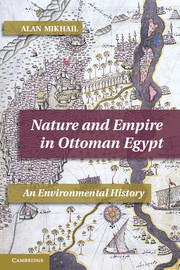Book contents
- Frontmatter
- Contents
- Maps
- Figures
- Tables
- Note on Transliteration and Dates
- Abbreviations
- Acknowledgments
- Map 1 Egypt and the Ottoman Empire
- Map 2 Lower Egypt (Nile Delta)
- Map 3 Middle Egypt
- Map 4 Upper Egypt
- Map 5 Cairo and Surroundings, 1801
- Introduction: Empire by Nature
- 1 Watering the Earth
- 2 The Food Chain
- 3 The Framework of Empire
- 4 In Working Order
- 5 From Nature to Disease
- 6 Another Nile
- Conclusion: The Imagination and Reality of Public Works
- Appendix: Citations for Cases Included in Tables 2.1–2.4
- Bibliography
- Index
- Titles in the series
2 - The Food Chain
Published online by Cambridge University Press: 03 May 2011
- Frontmatter
- Contents
- Maps
- Figures
- Tables
- Note on Transliteration and Dates
- Abbreviations
- Acknowledgments
- Map 1 Egypt and the Ottoman Empire
- Map 2 Lower Egypt (Nile Delta)
- Map 3 Middle Egypt
- Map 4 Upper Egypt
- Map 5 Cairo and Surroundings, 1801
- Introduction: Empire by Nature
- 1 Watering the Earth
- 2 The Food Chain
- 3 The Framework of Empire
- 4 In Working Order
- 5 From Nature to Disease
- 6 Another Nile
- Conclusion: The Imagination and Reality of Public Works
- Appendix: Citations for Cases Included in Tables 2.1–2.4
- Bibliography
- Index
- Titles in the series
Summary
The cultivation and movement of food – grown in earth irrigated through the social, ecological, and infrastructural mechanisms discussed in the previous chapter – was central to the Ottoman administration of Egypt in the long eighteenth century. Egypt was the breadbasket of the Ottoman Empire, producing more foodstuffs than any other single province in the Empire. The fertile soils of rural Egypt renewed every year by the sediment-rich waters of the Nile flood provided a steady supply of nutrients for the cultivation of all sorts of grains and vegetables in the Egyptian countryside. Rains in the Ethiopian highlands collected nutrients from the volcanic rock of the mountains on which they fell and from the Sudd swamps in the Sudan through which the floodwaters eventually traveled every year to Egypt. Once those waters covered the soil in Egypt, seemingly endless supplies of sunshine for photosynthesis produced vast quantities of chemical energy stored in the calories of food grown throughout southern Egypt and the Delta. As I discuss in detail in Chapter 4, a large peasant and animal population throughout the province provided the labor needed to harvest, pack, and move this food, which would eventually make its way to other parts of Egypt, to Istanbul, to the cities of Mecca and Medina, and to many other areas of the Empire. Egypt's surplus energy thus provided the caloric power necessary to maintain the political power of the Ottoman Empire.
- Type
- Chapter
- Information
- Nature and Empire in Ottoman EgyptAn Environmental History, pp. 82 - 123Publisher: Cambridge University PressPrint publication year: 2011



